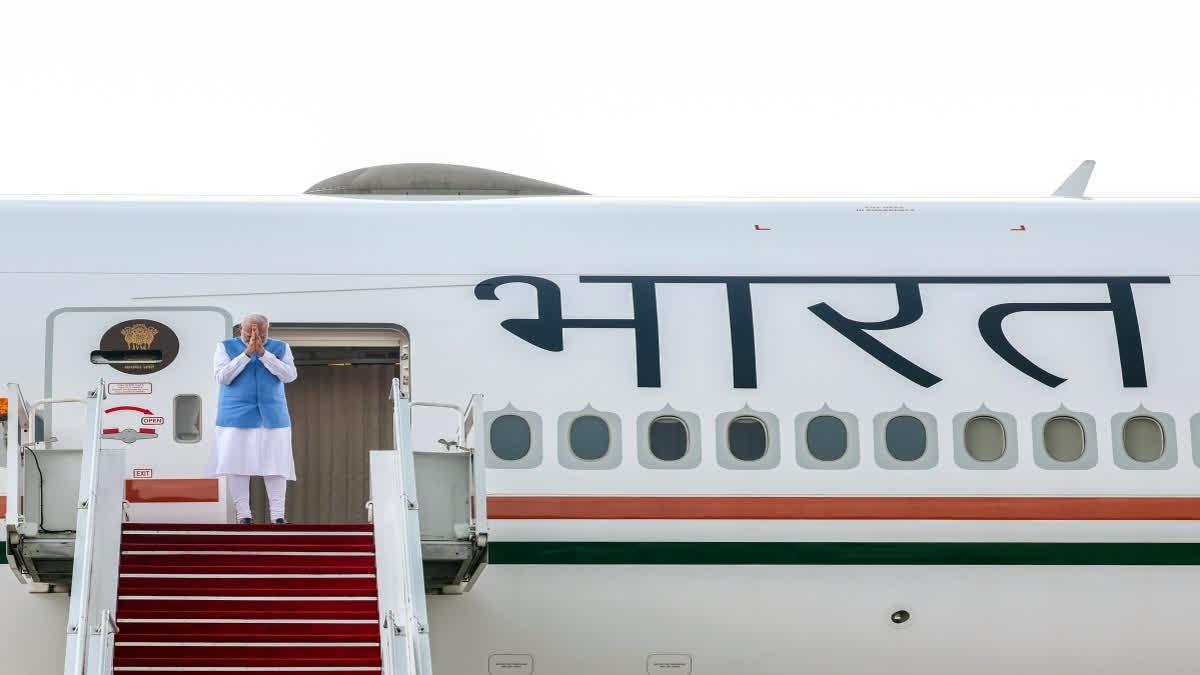New Delhi:After Brunei, Prime Minister Narendra Modi arrived in Singapore today. PM Modi is slated to meet several senior leaders including President Tharman Shanmugaratnam, Prime Minister Lawrence Wong, Senior Minister Lee Hsien Loong and Emeritus Senior Minister Goh Chok Tong.
Prime Minister Narendra Modi's visit to Singapore (ETV Bharat) The Prime Minister, who is visiting the country at the invitation of his Singaporean counterpart Wong, will also meet leaders from the business community. The trip comes ahead of the 60th anniversary of the two nations establishing ties and nearly a decade after they entered into a strategic partnership.
PM Modi will also meet business leaders in Singapore to explore potential areas of cooperation with India. According to the MEA, PM Modi is likely to focus on advanced manufacturing, digitalisation, and sustainable development.
During PM Modi's visit, India and Singapore are set to exchange a plethora of agreements, including a crucial one on creating a semiconductor ecosystem. Singapore has carved out a niche space for itself in the global semiconductor value chain over several decades. Singapore continues to invest in both hard and soft infrastructure to sustain its position. However, changes in the global situation led by the US-China rivalry and growing attention to de-risking are leading major economies (including India) to have their semiconductor industry. This may not have an immediate impact on Singapore, but coupled with the increasing cost of production and limited resources (land and labour) in Singapore, it can pose a serious challenge to Singapore’s current position in the global semiconductor industry.
Let's take a look at the diplomatic ties between the two nations
Diplomatic ties
India and Singapore established diplomatic relations on August 15, 1965, the same day Singapore gained independence. Even before formal diplomatic relations, India and Singapore had significant economic and cultural interactions due to Singapore's position as a trading hub and its Indian diaspora. After Singapore's independence from Malaysia in 1965, India was among the first countries to recognise Singapore as a sovereign nation.
This laid the groundwork for formal diplomatic relations. Over the decades, the relationship has strengthened through trade and investment. India and Singapore signed a Comprehensive Economic Cooperation Agreement (CECA) in 2005, which facilitated greater economic cooperation and increased bilateral trade. Both countries have engaged in defence and strategic cooperation, reflecting their shared interests in regional security and stability. Cultural and Educational Exchanges: There have been numerous cultural exchanges, and Singapore is home to a significant Indian community, further strengthening bilateral ties.
India-Singapore trade ties
Singapore is India's largest trade partner in the ASEAN, It is India’s sixth largest trading partner worldwide and accounts for 3.2 per cent of India’s overall trade. After the two countries signed the CECA in 2005, trade increased from $6.7 billion that year to $35.6 billion in 2022-23. Overall trade has risen 18.2 per cent from 2021-2022. India’s imports from Singapore were at $21.2 billion in the 2023-2024 financial year. That number was at $23.6 billion in the 2022-2023 financial year. India’s exports to Singapore totalled $14.4 billion in 2023-2024. That figure was at $12 billion in the 2022-2023 financial year – a rise of 20.2 per cent. Singapore is India’s leading source of foreign direct investment (FDI) at $11.77 billion.
India has around 9,000 companies registered in Singapore including six Public Sector Undertakings and nine banks. The Confederation of Indian Industry (CII) and the Federation of Indian Chambers of Commerce & Industry (FICCI) also have offices in Singapore. Over 440 companies from Singapore are registered in India including the Development Bank of Singapore and United Overseas Bank.
Indian diaspora in Singapore
Ethnic Indians constitute about 9.1 % or around 3.5 lakhs of the resident population of 3.9 million in Singapore. In addition, among the 1.6 million foreigners residing in Singapore, about 21% or around 3.5 lakhs are Indian citizens, mostly serving in financial services, IT, construction and marine sectors or are students. Singapore has the highest concentration of IIT and IIM alumni in any one city outside India. There are about one lakh Indian migrant workers in Singapore.
Multilateral cooperation
Singapore has joined the International Solar Alliance (in June 2023) and the Global Bio-fuel Alliance (in September 2023 during the G20 Delhi Summit). Singapore was the ASEAN Country Coordinator for India for the period 2021-24, during which India-ASEAN relations were upgraded to a Comprehensive Strategic Partnership.
